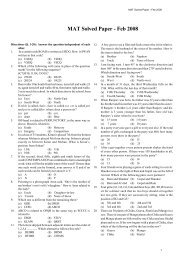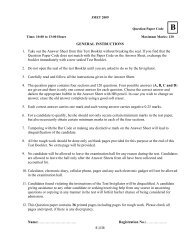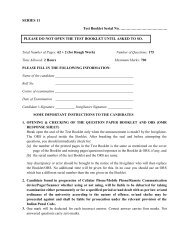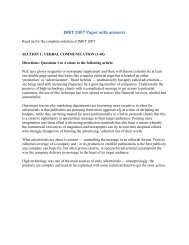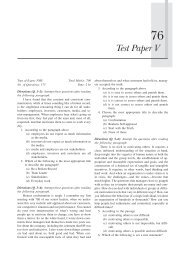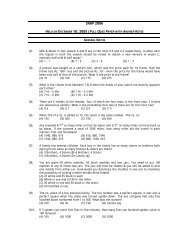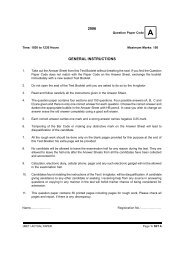PREVIOUS FMS QUESTION PAPER
PREVIOUS FMS QUESTION PAPER
PREVIOUS FMS QUESTION PAPER
Create successful ePaper yourself
Turn your PDF publications into a flip-book with our unique Google optimized e-Paper software.
1707. By the end of the eighteenth century, Delhi, shorn<br />
of the empire which gave it life, had sunk into a state of<br />
impotent dotage. The aristocracy tried to maintain the<br />
life-style and civilization of the empire, but in a mined<br />
and impoverished city raped and violated by a<br />
succession of invaders. The destruction created a mood<br />
conducive to elegy, and the great Urdu writers made<br />
the most of the opportunity. ‘There is no house from<br />
where the jackal’s cry cannot be heard,’ wrote Sauda.<br />
‘The mosques at evening are unlit and deserted. In the<br />
once beautiful gardens, the grass grows waist-high<br />
around fallen pillars and the ruined arches. Not even a<br />
lamp of clay now burns where once the chandeliers<br />
blazed with light…’<br />
On the throne in the Hall of Audience in the 'Qila-i-<br />
Mualla, the Exalted Fort sat the Emperor Shah Alam. He<br />
was a brave, cultured and intelligent old man, still tall<br />
and commanding, his dark complexion offset by a short<br />
white beard. He spoke four languages and maintained a<br />
harem of five hundred women; but for all this, he was<br />
sightless - years before, his eyes had been gouged out<br />
by Ghulam Qadir, an Afghan marauder whom he had<br />
once kept as his catamite. Like some symbol of the city<br />
over which he presided, Shah Alam was a blind<br />
emperor ruling from a ruined palace. At his court, the<br />
elaborate etiquette of Mughal society was scrupulously<br />
‘maintained’; poetry, music and the arts flourished. But<br />
beneath the surface lustre, all was rotten. Servants<br />
prised precious stones from the pietra dura inlay on the<br />
walls to sell in Chandni Chowk. The old court costumes<br />
were threadbare; the plaster was peeling. Mountains of<br />
rubbish accumulated in the city streets and amid the<br />
delicate pavilions of the Exalted Palace. Unable to see<br />
the decay around him, Shah Alam still could not escape<br />
its stench.<br />
With Iris Portal and the Haxby sisters I had heard the<br />
testimonies of the last British in Delhi. Now, in the cold<br />
of early December, I visited the chilly Delhi libraries<br />
searching for the accounts of the first English to<br />
penetrate the city’s walls in the late eighteenth century.<br />
The most detailed of the early descriptions was that<br />
written by Lieutenant William Franklin. Franklin had<br />
been sent to Delhi by the directors of the East India<br />
Company to survey the then unknown heartlands of the<br />
empire of the Great Mogul. Franklin’s account of his<br />
PP-02 2A.6<br />
<strong>FMS</strong> Dec 2010<br />
discoveries, published in Calcutta in the 1795 Asiatic<br />
Researches (the journal of the newly-founded Royal<br />
Asiatic Society) painted a melancholy picture of the<br />
once-great capital. Franklin had approached the city on<br />
horseback from the northwest. His first glimpse was of<br />
a landscape littered with crumbling ruins: ‘The<br />
environs are crowded with the remains of spacious<br />
gardens and the country-houses of the nobility,’ he<br />
wrote in his report. ‘The prospect towards Delhi, as far<br />
as the eye can reach, is covered with the remains of<br />
gardens, pavilions, mosques and burying places.’<br />
16. Which of the following is a correct statement?<br />
(1) Olivia is a painter<br />
(2) Olivia is the author’s neighbour<br />
(3) Olivia is a historian<br />
(4) Olivia is the author of the passage<br />
17. During the winter season in Delhi,<br />
(1) People largely stay indoors<br />
(2) Most people prefer to walk around the streets<br />
(3) The road side stacks are well-lit<br />
(4) None of the above<br />
18. Which of the following is a correct statement?<br />
(1) Bright saffron coloured silk flags fly over the<br />
new Muslim graves<br />
(2) Yellow and red silk flags fly over the new<br />
Muslim graves<br />
(3) Yellow and green silk flags fly over the new<br />
Muslim graves<br />
(4) All Muslim graves are covered with black flags<br />
19. According to the passage,<br />
(1) All the goats wear old cardigans<br />
(2) No goats wear cardigans<br />
(3) All the goats are given new cardigans to wear<br />
(4) Some goats wear old cardigans<br />
20. Which of the following is a correct statement?<br />
(1) The author of the passage was known to Iris<br />
Portal<br />
(2) The author was not familiar with the Huxley<br />
sisters





